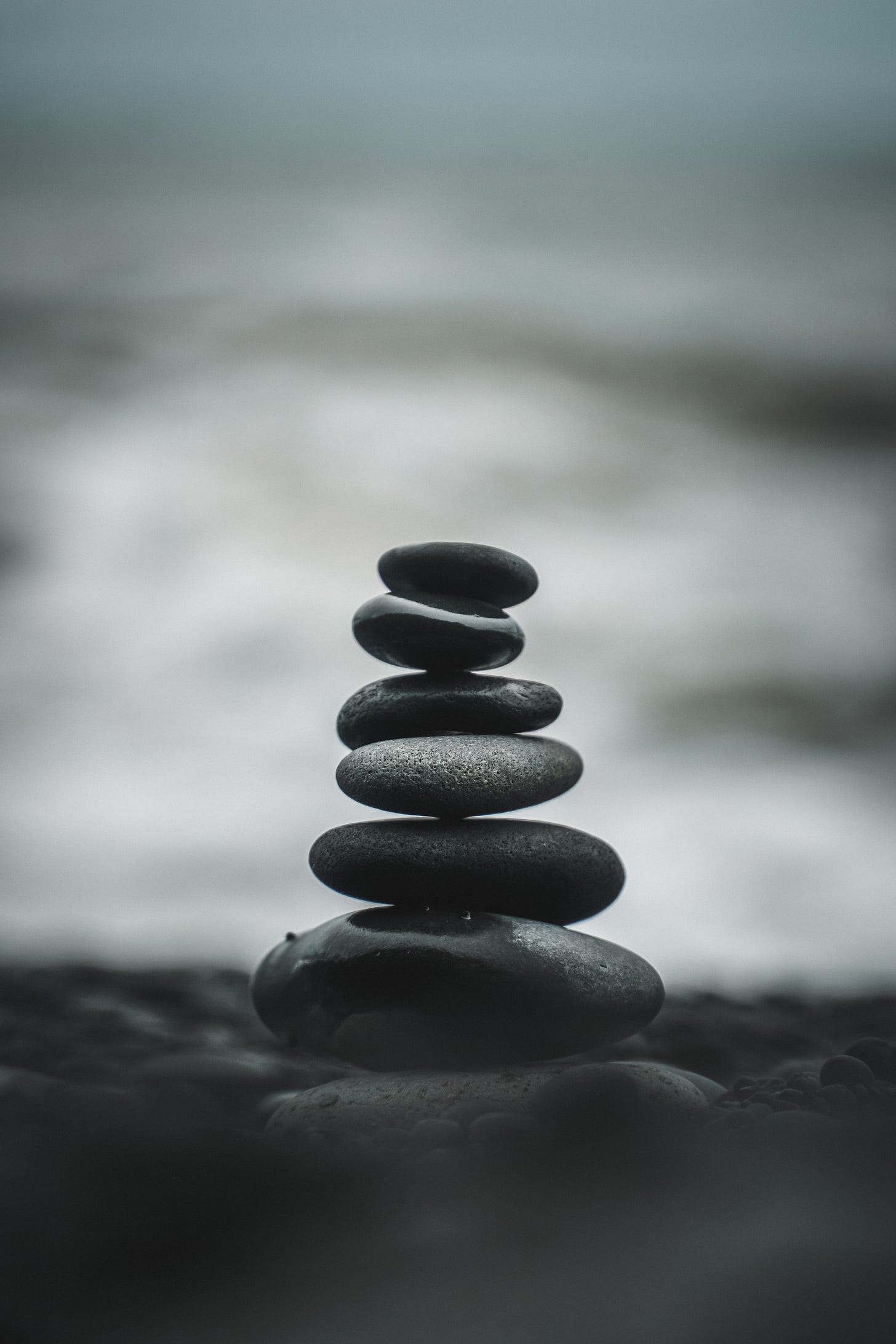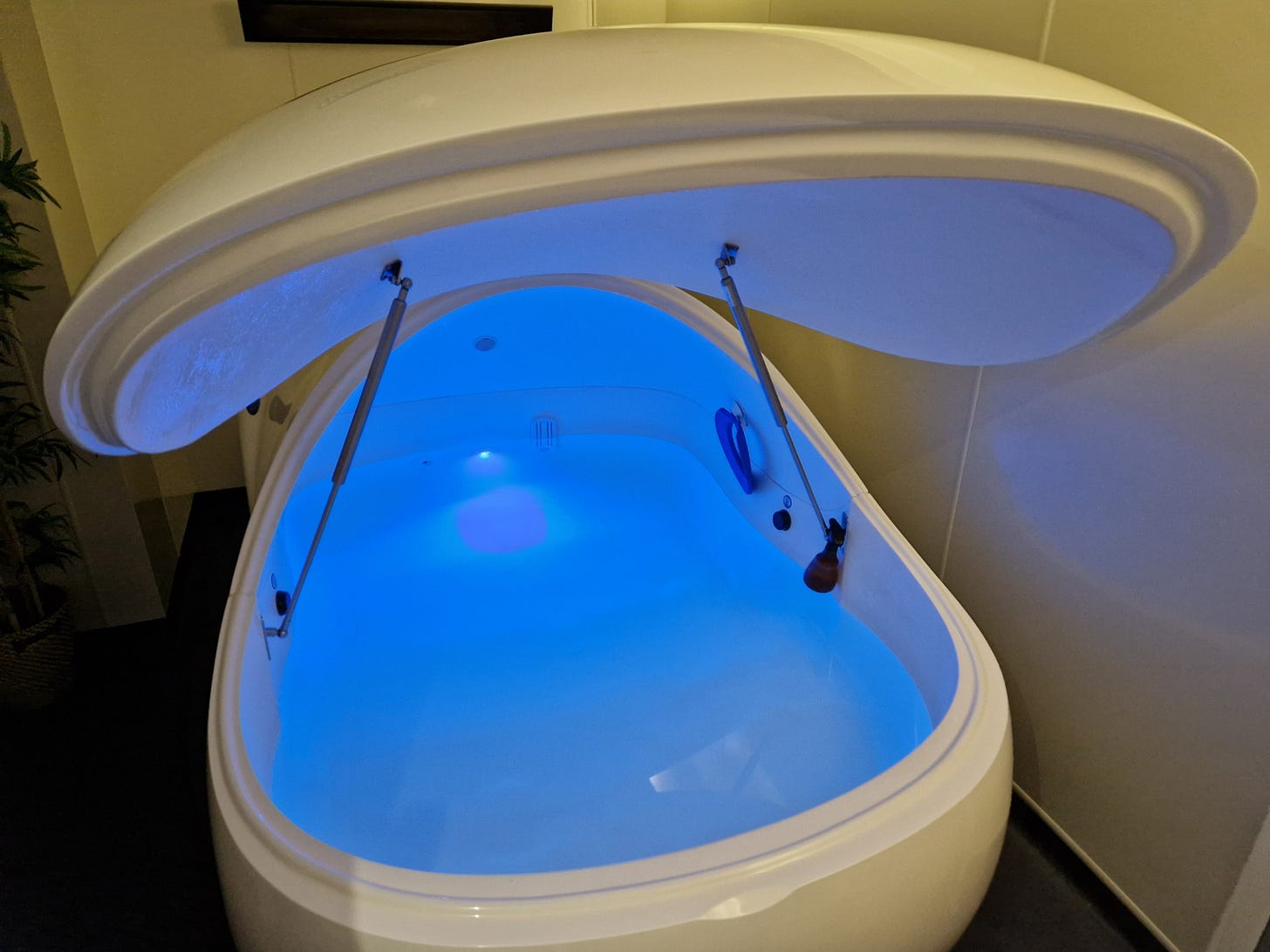Floatation Tanks As a Microcosm of the Spiritual Journey
My first hour in a self-contained universe of darkness, nakedness, and salty water
Hey, friend 👋
I often wonder why it feels so challenging to define spirituality, especially in conversation with other people.
I’ve come to realise everyone can generate their own definition when prompted, and if humanity’s answers were collected they’d form a wide spectrum.
This spectrum of spirituality spans a range of experiences and ideas between the extremes of “mindfulness is a conspiracy made by the lizard people who run Silicon Valley” and “I can tell from your aura you need the same flavour of healing crystal as my horse”.
Where you lie on this spectrum is ever-changing, if you’re paying attention.
By experimenting with:
Yoga
Exercise
Meditation
Creative hobbies
Musical experiences
Personal relationships
Psychedelics (if you carefully prepare your “set and setting”)
You’ll form a unique philosophy around spirituality which fits you like another layer of skin.
What makes sense to me is to pay closer attention to my state of consciousness as I make my way through the world. In my dictionary, mindfulness is recognising what state I’m in at that moment, and spiritual practice is anything which allows me to deliberately transition between states.
As a few examples, how you feel after an hour of yoga differs from an hour of running, an hour of listening to Hans Zimmer with the lights out, or an hour of sitting in traffic.
Taking a deliberate approach to your spiritual practice helps you pay attention and feel these layers with more clarity, like going from 480p to glorious 4K.
But our memories are short and practices need practice.
Practices unravel for as many reasons as there are ways to alter your state of consciousness:
We fall out of routines.
Our dodgy knee stops us from running as often.
A new relationship and promotion pick our week’s pocket when it’s looking the other way.
This is why many hobbies and habits fall in the broad category of, “I used to do this regularly and can’t remember why I stopped, but as soon as I start again I love it”.
That particular layer’s become blurry over the course of weeks and months, and you struggle to remember the specifics of why you enjoyed it so much.
One of my recently blurry layers was the feeling of dreamy calmness, induced by a few hours in a spa. It’s one of my favourite stress relievers (get your mind out the gutter…), but one that’s only justifiable a few times a year at best.
Spa days don’t come cheaply in London, and so on a Tuesday when my wallet felt particularly heavy, I decided to spend an hour in a floatation tank.
Floatation Tanks
I hadn’t heard a huge amount about floatation tanks (also called sensory deprivation tanks) before I committed to an introductory package of three 1-hour sessions.
I’d listened to Joe Rogan talk about them on his podcast.
I’d heard legendary physicist Richard Feynman was a fan and would take ketamine to alter his state of consciousness further while inside.
I’d see the occasional social media post from someone who’d boshed a load of mushrooms and sat in one for a couple of hours.
Before I arrived, I briefly read up on the science:
Humans float in the Dead Sea because of the density of its super-salty water, and floatation tanks work in the same way. Each tank contains body-temperature water, infused with 450kg of Epsom salts to keep your body buoyant, and the tank itself is soundproof and, thanks to a handle above your head, is completely dark when fully closed.
The science outlining the benefits of floating seems compelling. A few interesting examples include:
Lower cortisol levels
Reduced blood pressure
Self-reported increases in relaxation, happiness, and overall well-being
But “overall well-being” is a vague, catch-all term for how a group of people might have described their individual layers of experience, so the rest of this piece documents my first experience and its after-effects in more detail.
Getting In
It was a noticeable contrast, I thought, as I gingerly lowered myself into this self-contained universe like a pensioner with a particularly slippery bath. Only 10 minutes before, I was stepping through the busy Thameside flats and roads.
I lay flat on my back, paid closer attention to the calming music, nudged into the tank for the first 10 and last 5 minutes of the hour, and breathed deeply.
The first 10-15 minutes were like a typical beginner’s experience of meditation:
You wonder if you’re doing it “right”.
You try too hard to get out of your own head, to enjoy the moment without the buzzing of distracting thoughts.
You can find yourself trying to push these feelings away, keen to make the hour “worth it” as you visualise the pounds and pence drifting away by the minute.
But all these thoughts are just that. Thoughts. Another layer of clouds in the sky of consciousness.
In this case, I found myself drafting this piece, trying to make sense of my mind in scattered think-writing. I often have this experience with meditation too, my mind imitating an analytical football commentator who’s talking too loudly over the action.
This approach takes you out of the moment and is why people like us should take time for spiritual practices in the first place. Not everything can or should be immediately analysed in depth.
At some point, my mind sank into the moment while my body floated with the nonchalance of a plastic duck. With my front exposed to the humid air and my back submerged, the tank had transformed into a cosy, wet hammock.
Suddenly, my mind was yanked from the immersion…
Maybe I shuffled my arms a bit too aggressively. Maybe it was my head.
Either way, the saltwater irritated my eyes with the fury of a thousand onion roots. I understood why they put a clean water bottle inside the pod and wondered how many first-time goers struggle with the same teething issue.
At one point, I had to jettison my upper body from the tank to scrub my face with a towel.
With that problem solved, I became acutely aware of my lack of neck, back, and hip mobility. I’d stretch my body out and listen to the creaks and cracks underwater through the earplugs.
Six months of regular writing but irregular yoga practice takes its toll.
The remaining minutes drifted away, a vague block of time which was both the longest and the shortest in recent memory.
Did I have any profound insights about myself, my life, or the human condition?
I couldn’t recall if I even thought about lunch.
Getting Out
When I emerged as a revitalised landlubber, I felt blissful in the shower. I could feel the warmth of the water more closely on my skin, with pinpoint resolution. I wasn’t trying to make sense of my experience any more. I was actually experiencing it.
I wasn’t looking over the shoulder of the present moment. I wasn’t half-rehearsing how I’d describe my time in the tank to my housemate, who’d been in his own room next door.
I felt no urge to start scratching my thoughts down or catch up on any tweets or texts.
But I couldn’t shake off all my quirks and neuroses…
The constant improver, the iterator, was still there.
How could I improve the next time? What happened in the first 10 minutes that stopped me from “arriving all at once”?
I found myself resolving to take my second session more slowly, more deliberately. Like a horny sloth tracking down a mate.
I was keen to approach the rest of my day with similar energy.

And I did take life slow. For about 30 minutes.
In the relaxation room, armed with a cup of somewhat-fruity tea, I jotted down some thoughts, ready to feed into the first draft of what you’re reading now. But I wrote them with more consideration and more willingness to sit with my thoughts without judging them. At my skill level that’s a useful benefit, if only temporary.
Reading it back, my handwriting was as erratic as usual and I didn’t feel inclined to illustrate my ideas with any drawings. The benefits of one hour, or the practice as a whole, can only make so much difference in how you think and act.
As we left, moving around Central London felt smoother.
Less stressful.
I paid closer attention to the people and buildings as we meandered through the side streets. Life was sweet and I was seeing it through calm, open eyes.
Then, true to form, I ate an enormous (and delicious) lunch an hour later and spent most of the afternoon in a food-relaxation coma on my sofa. It was easier to pay mindful attention to the present during the rest of the day, but I spent a large chunk of it digesting and consuming.
In some ways, it would have been more useful to “make more” of the day.
But sometimes there’s deeper value in giving yourself that mental and physical rest. Not every day needs to be maximised. We can carpe the diem in different ways.



Sounds amazing! I loved how you touched base on the beginner syndrome ‘ am I doing it right?’ Defo hit home! I was pulled in from the start and I’m so happy you wrote about it… I’m thinking of trying it out, thanks Alex 😊
Hi Alex that sounds like a wonderful experience, not quite the same as putting your head under the duvet. Very impressed in your post, quite agree about having interests whether physical, mental or artistic. Looking forward to your next post. X